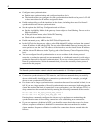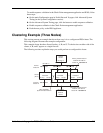
Nokia Network Voyager for IPSO 4.0 Reference Guide 237
If you specify an invalid FTP server or an invalid path to a valid server as the source of the
image, Cluster Voyager does not respond with an error message and displays the following
messages instead:
New Image installation in progress
Please don't perform a cluster reboot until all nodes have finished
the upgrade.
If IPSO does not also display additional messages indicating that the download is
proceeding (there might be a short delay), the FTP information might be incorrect. Correct
the FTP information if required and begin the download again.
3. After the new image has been successfully installed on all the nodes, you need to reboot the
nodes so that they will run the new image. When the system prompts you to reboot the
cluster, click Manage IPSO images (including REBOOT).
4. On the IPSO Cluster Image Management page, click the Reboot button at the bottom of the
page.
Note
Clicking this button allows you to perform a cluster safe reboot, which ensures that no
traffic is dropped while the cluster reboots (see “Rebooting a Cluster”). If you manually
reboot each node by clicking the Reboot buttons associated with the individual nodes,
there might be a period in which all the nodes are out of service.
5. On the Cluster Safe Reboot page, click Apply.
The upgraded nodes retain any cluster configuration information that was created with the
previous version of IPSO.
Rebooting a Cluster
When you click Reboot, Shut Down System on the main configuration page in Cluster Voyager,
you see the Cluster Reboot, Shut Down System page. At the bottom of this page is the Cluster
Traffic Safe Reboot link. If you click this link and then click Apply, the cluster nodes are
rebooted in a staggered manner. The process is managed so that only one node is out of service
at a time. For example, if you reboot a three-node cluster, one of the nodes controls the rebooting
of the other nodes. This node is called the originating node.
The originating node reboots each of the other nodes in order. It waits until each node has
successfully rebooted and rejoined the cluster before rebooting the next node. Once all the other
nodes have rebooted and rejoined, the originating node reboots itself.
Note
The originating node is the node that you are logged into. It might not be the cluster master.


















